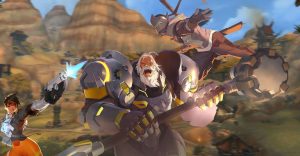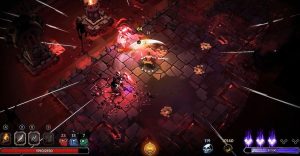How AC Valhalla’s Norse Gods Compare To God Of War’s

Norse Mythology and its Pantheon have become increasingly popular in the past decade, and its Gods have been used to inspire narrative arcs for games like Assassin’s Creed Valhalla and God of War. When developers design something that takes inspiration from ancient mythology, one of the delicate aspects of design is creating something that stays true to the original content while also providing a unique take that pushes the story of the game forward. Compared to one another, both Assassin’s Creed Valhalla and God of War have been able to delicately balance their use of Norse Mythology without seeming too similar to each other.
Of course, it isn’t really Norse Mythology without big-name characters such as Odin, Thor, Loki, Tyr, Freyja, and the like. It’s important to note that the versions of these Norse Gods seen in both games are going to have a lot of similarities, as well as certain events that have unfolded in their respective universes. Nonetheless, there are quite a few comparisons that can be made between Assassin’s Creed Valhalla and God of War that showcase how their use of the Norse Pantheon is unique.
The biggest difference between both games is that God of War’s Norse Mythology is displaced by the presence of Kratos, while Assassin’s Creed Valhalla doesn’t really have a Norse Pantheon. Instead, the Norse Pantheon in Assassin’s Creed Valhalla is used by Eivor to give her a better understanding of the events that transpired with the Isu, the Great Catastrophe, and the human survivors. The major differences between the two games’ interpretations of Norse Mythology are significantly impacted by Loki’s character as well.
Major Norse Mythology Differences Between AC Valhalla & God Of War

Without a doubt, Loki is the character in both games that has the starkest contrast in every sense of the word. In Assassin’s Creed Valhalla, Loki serves alongside Odin in his council with the likes of the aforementioned characters as well. He is the central antagonist to the Aesir and Vanir gods in the game, constantly devising plots to bring about the end of Odin. In God of War, Loki is really the son of Kratos, and this significant change is really what sets up the game’s Norse storyline. Without Loki’s trickster ways to thwart Odin’s plans, the Norse God and his kin are able to completely dominate the nine realms and even manage to force the Jotnar back into Jotunheim prompting the giants to seal off their realm entirely.
Conversely, Loki is ever-present in Assassin’s Creed Valhalla as an adult, allowing him to fill the central antagonist role as he does in Norse Mythology. For example, in AC Valhalla, Loki is behind the failed assassination attempt of Odin when the unnamed Jotun works in Asgard to build a defensive shield for the Aesir. Though Odin defeated the giant, Loki was suspected of foul play and cast out from Asgard. In God of War, Mimir tells a story of a similar occurrence that happened before Loki, better known as Atreus, and Kratos travels around Midgard.
In this story, however, Mimir tells the father and son duo that the giant Hrimthur, son of the original stonemason named Thamur, was the one who built a wall around Asgard thanks to his father’s teachings. Unfortunately, both Hrimthur and Thamur were killed by Thor in this interpretation, but this is likely due to Loki’s influence being absent before the events of God of War. Stories like this are constantly shared throughout God of War, prompting the idea that Loki’s influence plays an important role in both games’ Norse Mythology interpretations.
Additionally, this particular event in Assassin’s Creed Valhalla represents Odin’s bad idea that was thought of to prevent the Great Catastrophe or at least the idea of the advanced civilization that would ultimately perish. Much like how the builder’s tower was never completed, the actual project was abandoned and never finished either. Through her visions, Eivor relives the memories of those that came before her as the stories of the Norse Gods, while Kratos’s direct injection into Norse Mythology destabilized what would likely be a similar depiction to that of AC Valhalla.
AC Valhalla Vs. God Of War: Norse God Character Differences & Similarities

Aside from pivotal moments, the other major difference in the two games’ Norse Gods comes from the contrast in characters. In both God of War and Assassin’s Creed Valhalla, Ragnarok consumes Odin’s attention, and his obsession with preventing it drives his decision-making. While God of War‘s Odin has only been described by the lives of those he has affected, the Odin in Assassin’s Creed Valhalla is selfish, vengeful, and indifferent to anyone’s life but his own. In general, the Gods seen in God of War have always had personalities that reflect Kratos’ anger and vengeful nature, and Odin sounds as if he will fit this description come to God of War: Ragnarok. Odin in AC Valhalla appears to be a bit more charismatic but still has a selfish and dogmatic personality all the same.
Like Odin, Thor in God of War has yet to be seen, but his impatience and blood lust appear to be just as prominent as the Thor of AC Valhalla, according to the stories. Thor often makes up for his lack of intellect through brute force, but a 2021 trailer for God of War: Ragnarok revealed lines from Thor saying “You seem like a calm and reasonable person. Are you a calm and reasonable person?” This suggests that Thor in God of War may be a bit more intellectual than his AC Valhalla counterpart, but the tone of the dialogue definitely shows that the Norse God of Thunder has a more serious nature.
Though Freyja and Frigg are two separate characters in Assassin’s Creed Valhalla and in Norse Mythology, the two are actually denoted as one character in God of War named Freya. This is a bit confusing because Freyja is the queen of the Vanir gods and wife of Odin, while Frigg is a mistress of Odin and mother of Baldur in AC Valhalla. In God of War, Freya is both the queen of the Vanir gods and mother to Baldur. In Norse Mythology, Frigg is actually the wife of Odin, but Freyja is still considered to be a member of the Vanir gods. In fact, things even get a bit more complicated as Norse Mythology experts have long discussed whether or not the two are one in the same goddess. Nonetheless, the characters in both games are similar as well in terms of their roles in the adaptations of the Norse Pantheon.

In both AC Valhalla and God of War, the Norse Gods Tyr and Baldur are pretty similar to one another. Baldur’s death is ultimately what begins the dawn of Ragnarok in both games. Unfortunately, Baldur’s death in Assassin’s Creed Valhalla occurs before players are able to interact with the Norse God of Light, so there isn’t much to compare between the two in regards to their character traits. While interactions with Tyr have yet to occur in God of War, it can be inferred through Mimir’s stories that the Norse God of War is a gentle deity who prefers peace to conflict. Similarly, Tyr in AC Valhalla does not show much of his power through force, but rather he displays his strength through rhetoric in an attempt to foster peace and prevent conflict.
Loki, or Atreus, is God of War’s Norse centerpiece as the child of Jotun prophecy. As the son of Kratos, Loki is being taught strength through restraint and discipline. This has turned the otherwise villainous Norse God into a heroic figure that shows genuine compassion. Though he seems to be easily influenced by power and those he surrounds himself with, the two characters between both games have the starkest contrast. The Loki in Assassin’s Creed Valhalla has more in common with the traditional Norse God, using trickery magic and plots to achieve his own goals. In fact, Loki and Odin have a lot in common with each other in Assassin’s Creed Valhalla as far as their motivation for their own self-interest is concerned.
The adaptation of Norse Mythology in AC Valhalla and God of War have given players some of the greatest ancient mythology-inspired games ever created. Regardless of the similarities and differences between both Assassin’s Creed Valhalla and God of War and Norse Mythology itself, the detail of both games shows how powerful ancient influences can be even in modern times.
About The Author

















